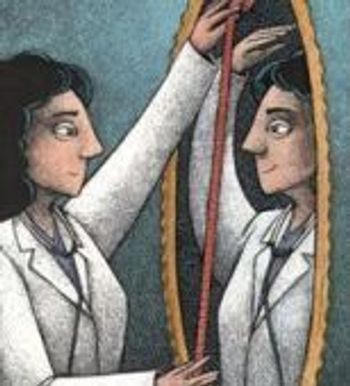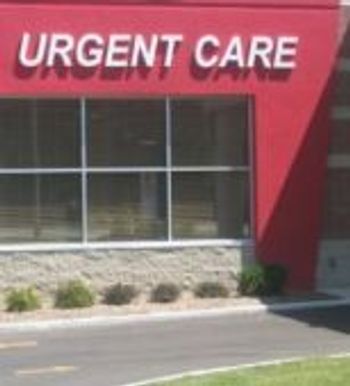
Special Feature
Articles by Special Feature


Sorry, doctorsâ€"no more coffee mugs, no more pens, no more note pads, no more free restaurant meals. That's the gist of the new marketing code of ethics put out by PhRMA, the brand-name drug industry's trade group, which also suggests that drug companies cap speaking and consultant fees to doctors. Under the code, drug companies must also require doctors who are paid speakers or consultants to reveal those ties if they sit on committees that compile drug formularies or treatment guidelines.

It happens every day. Consumers are bombarded with attractive offers to sign up for new credit cards. Businessesâ€"including physician practicesâ€"find themselves in the same position. According to David Goodman, vice president of communications for Advanta Corp., the small business credit card market is large and growing. Business credit cards can help physician practices simplify bookkeeping, keep business expenses separate from personal expenses, earn valuable rewards, and protect themselves from fraud.

As the bears hold sway on Wall Street, it may seem like locking the barn door after the horse is gone, but it helps to know just how risky your portfolio is. A good way to find out is through RiskGrades, where you'll find a wide array of tools to help you gauge risk.

Most investors who haven't already given up on the stock market are hoping that the bear will soon loosen its grip and that stocks will return to decent gains. But if you're putting your money into a retirement fund on a regular basis and you're not planning to retire in the next 5 years or so, rooting (just a little bit) for the bears makes some economic sense.

The topic of work/life balance is one that is near and dear to most people’s hearts, particularly surgeons. And according to a 2003 study published in the Annals of Surgery, which predicted a 50 percent shortage in some surgical specialties combined with an increased demand for surgeries, that work/life balance could become more precarious.

District of Columbia officials have launched an investigative probe into the affairs of CareFirst Blue Cross Blue Shield and, at the same time, have filed a lawsuit that would force the health insurer to donate millions of dollars to the community. CareFirst has members in DC, Northern Virginia, and parts of Maryland. Some observers believe the lawsuit and the probe, which has been given subpoena power, are partial payback for CareFirst’s failure to contribute an expected $5 million to a District universal healthcare program.

Want a snapshot of the reimbursement environment in today’s healthcare system? Nancy Davenport-Ennis, founder and CEO of Patient Advocate Foundation (PAF), describes it as lower reimbursement to physicians, hospitals and clinics, with simultaneous higher cost shifting to the individual consumer. “We’ve got the perfect storm,” she says, “and the individual consumer is simply not in a place where he or she can pay those dollars.”

One of the reasons often given for the nation’s shortage of primary care doctors is lower salaries, which lead medical school graduates to choose higher-paying specialties like cardiology and orthopedics. A recent report from the healthcare staffing firm Merritt Hawkins highlights one of the more unusual aspects of the primary-care income squeeze. According to the report, certified nurse anesthetists recruited by the firm had an average salary of $185,000, higher than family practice physicians, who averaged $172,000, and internists, who averaged $176,000.

Reading a mutual fund prospectus may make your eyes glaze over, but it helps if you know what to look for. In the opinion of many fund experts, the most critical piece of information you'll find in the prospectus is the fund's expense ratio. Too many physician-investors focus instead on past performance, which can be misleading, while ignoring the fact that high fund expenses can blow a big hole in the most carefully planned portfolioâ€"an effect that can be intensified by a bear market.

Online physician ratings…Consumer advocates push them, doctors don’t like them, and it turns out that most patients ignore them. A recent Harris Interactive poll commissioned by the California Healthcare Foundation shows that fewer than one-fourth of consumers look at online doctor ratings and only a tiny fraction—about 2%—have changed doctors based on knowledge they gained from a ratings site. The poll also showed that online ratings make little difference in consumer choices about hospitals and health insurance plans.

In today’s world of reality-based television programming, the words “You’re fired” have become synonymous with Donald Trump as he weeds through candidates to determine who will become his next apprentice. Seldom are those words associated with the physician-patient relationship. In reality, however, their meaning—if not the actual words themselves—is conveyed more often than you might imagine. “Doctors want to help out,” explains Laura Dixon, BS, JD, RN, CPHRM, director, Department of Patient Safety, Western Region, for The Doctors Company, a physician-owned medical malpractice company. “They don’t recognize that it’s okay to send a patient on. It happens more frequently than they think.”

Well-educated professionals that have financial advisors buy into recommendations for structured products, which are sure to generate a high fee, but may not benefit the investor. Think about the recent collateralized mortgage scandal. All of these investors are on the short end of the stick. Someone else is making money, but they're not. One way to describe these investors' actions is "optimism over realism." As Warren Buffet says, "It is optimism that is the enemy of the rational buyer." So why aren't many investors acting in their own best interestsâ€"that is, in a rational way? That is the subject of this three part series, "My brain made me do it."

When the legendary Donna Summer sang that “they said it really loud, and they said it on the air, on the radio,” she knew the words she’d heard about her boyfriend’s feelings had to be true. After all, it was said on the radio. Today, physicians are sending a similar, truthful message, though not necessarily about the feelings we have for our loved ones. Instead, doctors are providing listeners and listener call-ins with useful medical information—often helping individuals “open up” about an illness or condition they might have been hesitant to speak about face to face. The airwaves are also providing physicians with another vehicle for reaching out to healthcare consumers.

Researchers have expended considerable time and effort in an attempt to quantify and describe the extent, character, and effects of disparities in the quality of healthcare received by racial and ethnic minorities in the US. An interesting article by James D. Reschovsky, PhD, and Ann S. O'Malley, MD, MPH, in the April 22 Health Affairs, titled “Do Primary Care Physicians Treating Minority Patients Report Problems Delivering High-Quality Care?” addressed this topic from the perspective of primary care physicians.

Universal health care will appear on the shareholder proxy ballots of a number of major corporations this year, according to a New York Times report. The shareholder proposal does not address issues of health benefits for employees but instead asks the companies to develop principles for “comprehensive health care reform.” Although some companies have argued that shareholder voting is not the proper venue for the proposal, those offering it recently got the blessing of the Securities and Exchange Commission, which has ordered several companies to put it on their proxy ballots.

Patients online … making self-diagnoses … exchanging clinical information … what’s this world coming to? That’s not an exaggeration when compared to the way many physicians initially reacted to the advent of online health-focused patient Web exchanges about a decade ago. “When I first started off with this site [DailyStrength.org], I had the same fears that a lot of other physicians had; that people would be on these sites and exchanging misinformation,” recalls Sharon Orrange, MD, an assistant professor of medicine at the University of Southern California and a practicing internist. “Even when I joined as a medical advisor I was a little leery of it.”

There is death, there are taxes, and there's death from taxes on gains from investments. This metaphorical fatality comes not from a single pass of the grim tax reaper's sword, but from a thousand cuts. Yet there are ways to heal some of the wounds inflicted by the marauding swordsmen of the IRS. Some of these methods, such as holding retirement assets in tax-deferred accounts, are obvious to even the most casual individual investor.

How important is long-term disability insurance for physicians? Just ask a Maryland-based neurologist who was diagnosed with Parkinson’s disease in 2003 and soon was unable to maintain business as usual. For the sake of his privacy, we’ll call this physician Richard Mason, M.D. “As my private practice income diminished to nothing, disability insurance provided monthly supplementary income which kept my family financially afloat,” Mason explains. “We would have lost our house had it not been for the insurance.”

In 2002, Stephen Beeson, MD, a board-certified family medicine physician practicing with Sharp Rees-Stealy Medical Group in San Diego, was asked to serve as coach for the group’s Sharp Experience, an organizational commitment to service and operational excellence. He began compiling a war chest of material related to training and coaching physicians, and before long he had a substantial curriculum involving different elements of physician performance. Beeson thought, “I could write a book on this,” and so he did—Practicing Excellence: A Physician’s Manual to Exceptional Health Care (Fire Starter Publishing, 2006).

After contamination in the blood thinner heparin produced in China resulted in more than 80 deaths in the United States, Baxter International, the drug's largest manufacturer, suspended production and recalled most of its heparin products. That move has caused a shortfall in the supply of heparin, which is prescribed tens of millions of times annually, and has opened up new safety concerns as medical staff deal with heparin that is coming from drug makers in different quantities and strengths than nurses and doctors are accustomed to.


Smokers who use Pfizer's Chantix to help them quit are at higher risk for heart trouble, seizures, and diabetes, according to a recent report from the Institute for Safe Medication Practices. The institute's study reviewed adverse-event reports received by the FDA and found 988 serious incidents linked to Chantix in the US in the fourth quarter of last yearâ€"the highest number of reports for any drug during that period. The study's authors called on Pfizer to strengthen the label warnings for Chantix, claiming that the current warnings are inadequate.

If you have minor children, the lawyer who draws up your will probably will ask you to name a guardian for them. It's a very important decision. If anything should happen to you and your spouse, your children's future well-being could depend on the person you choose for this crucial job.

Whereas physicians have historically invested time in continuing their medical education throughout their careers, today they’re doing so with a more business-like approach. Business as in Masters in Business Administration. Educational facilities are realizing that as well. According to the National Association of MD/MBA Students, there are currently 54 schools in the U.S. that offer a dual MBA and MD degree. Ten years ago, there were fewer than 12.

Five years ago, physician concerns with the nation’s healthcare system were two-fold: They said they were spending less time with patients, and they needed to work harder to maintain an income. Those same concerns are often voiced by today’s medical doctors.

“I’m not sure if a lot of the phenomenality of [the growth] is due to recognition more than explosive, exponential growth,” says Lou Ellen Horwitz, executive director of the Chicago-based Urgent Care Association of America. “Definitely, there is growth. We probably see a new one opening up every week. But prior to people paying attention, there may have been one opening every other week, but it wasn’t on the radar.”
